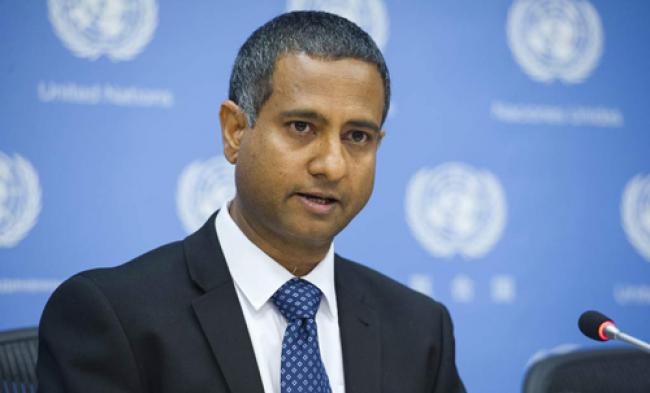Rights
Women Iran: UN urges immediate halt to woman’s execution
15 Apr 2014, 08:39 am Print

New York, Apr 15 (JEN): A United Nations independent expert has issued a strong call on the Government of Iran to halt Tuesday’s scheduled execution of an Iranian woman said to be the victim of physical and sexual assault, seriously concerned that she did not receive a fair trial.
Reyhaneh Jabbari, an interior designer, was sentenced to death for the alleged murder of Morteza Abdolali Sarbandi, a former employee of the Iranian Intelligence Ministry, in a case that has raised legal concerns.
“The Iranian authorities should review her case and refer it back to court for a re-trial, ensuring that the defendant due process rights guaranteed under both Iranian law and international law,” said Ahmed Shaheed, the UN Special Rapporteur on the situation of human rights in Iran.
The UN Office for Human Rights (OHCHR) says that according to reliable sources, Sarbandi hired Jabbari on 7 July 2007 to redesign his office. Rather than taking Jabbari to his office, Sarbandi took her to a residence where he physically and sexually assaulted her. Jabbari reportedly stabbed Sarbandi in the shoulder in self-defense, escaped and called for an ambulance out of concern for her alleged attacker.
However, the Special Rapporteur warned that Jabbari’s conviction for pre-meditated murder was allegedly based on confessions made under threat possibly equivalent of torture. “Jabbari’s case raises serious due process concerns,” said Shaheed, “particularly with regard to her interrogation and the reluctance of the court to take into account all relevant circumstantial evidence into its judgment.”
Since her arrest and throughout her trial, Jabbari has insisted that her actions were taken in self-defense and were for preventing a potential serious assault on her. She has also alleged being forced to confess to actions under severe duress.
Given this evidence, Shaheed said this seriously called into question whether factors highly related to the case were considered in the court’s verdict and sentencing of the woman.
“Sexual violence, often directed against women, must always be fought in all of its forms,” the expert emphasized, adding that “if her allegations are true, Jabbari may have been doubly victimized; first by her attacker, and then by the judicial system, which is supposed to protect victims of intended and actual sexual and physical assault.”
Regretting the spike in executions this year in Iran, Shaheed noted with particular concern that imposing the death penalty obviously goes against the current international trend to encourage a moratorium on, and abolition of the death penalty. He strongly urged the authorities to immediately halt the executions and to join this global trend.
So far over 170 persons, including at least two women, have been executed since the beginning of 2014 and a large number of prisoners on death row risk imminent execution.
Independent experts or special rapporteurs are appointed by the UN Human Rights Council to examine and report back on a country situation or a specific human rights theme. The positions are honorary and the experts are not UN staff, nor are they paid for their work.
Special Rapporteur on the situation of human rights in Iran Ahmed Shaheed. UN Photo/Amanda Voisard
More Rights
- UN condemns Taliban ban on women attending medical classes in Afghanistan
- One woman was killed every 10 minutes by their partner or relatives across the world, says new UN report
- American inmate's wife to receive $5.6 million in settlement after she was sexually assaulted during strip search
- China: 19-year-old woman decides to end her life after she was forced forcefully engaged to a man
- Meet a Hindu woman doctor who creates history by filing nomination for Pakistan general polls






